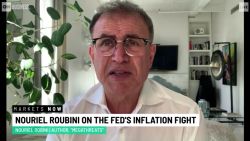A version of this story first appeared in CNN Business’ Before the Bell newsletter. Not a subscriber? You can sign up right here. You can listen to an audio version of the newsletter by clicking the same link.
Russia’s economy is under serious pressure from tough new Western sanctions. That’s forcing financial institutions to consider: Just how exposed are they if it implodes?
What’s happening: Foreign banks had more than $120 billion in claims on Russian counterparties at the end of September 2021, according to the Bank for International Settlements.
That’s sparking concerns that as the ruble collapses and Russia becomes increasingly cut off from the global financial system, missed payments could pile up and trigger large losses.
France’s Societe Generale (SCGLF) and Italy’s UniCredit (UNCFF), the two major European banks with the biggest operations in Russia, face particular scrutiny. Since Russia invaded Ukraine last week, shares of SocGen have plunged 25%, while UniCredit (UNCFF) is 23% lower.
Fitch Ratings warned on Wednesday that “large western European banks’ asset quality will be pressured by the fallout from Russia’s invasion of Ukraine,” and that their operations also face increased risk as they race to comply with international sanctions.
Where’s the weakness? Fitch said it mostly comes down to corporate and investment banking operations as well as investment portfolios. There are concerns that entities affected by sanctions won’t be able to repay loans, forcing the banks to write some of them off.
Sanctions compliance, especially with some top Russian banks excluded from the SWIFT global payment system, will also pose a challenge, Fitch said.
In a statement on Thursday, Societe Generale said that it is “rigorously complying with all applicable laws and regulations and is diligently implementing the measures necessary to strictly enforce international sanctions as soon as they are made public.”
The bank said it had almost $21 billion in exposure to Russia at the end of last year. But it emphasized that it can withstand even the worst outcomes.
Societe Generale “has more than enough buffer to absorb the consequences of a potential extreme scenario, in which the Group would be stripped of property rights to its banking assets in Russia,” it said.
UniCredit, which has been operating in Russia since 1989, said last week that its Russian arm was “very liquid and self-funded,” and that the franchise accounts for just 3% of the bank’s revenue.
Earlier this year, it dropped a potential bid for Russian state-owned bank Otkritie because of the political situation in Ukraine.
US banks could feel pain, too. Citigroup disclosed this week that it had $5.4 billion “in Russia credit and other exposures” at the end of 2021. Mark Mason, Citi’s chief financial officer, told investors on Wednesday that the bank has been performing tests to evaluate the consequences “under different stress type of scenarios.”
Shares of Citi have dropped 4% since Russia’s invasion. The KBW Bank Index, which tracks US lenders, is almost 2% lower.
Why it matters: In a note to clients on Sunday, Credit Suisse investment strategist Zoltan Pozsar invoked Lehman Brothers’ collapse in 2008 when considering the consequences of cutting Russian banks off from SWIFT. He said the effects could ripple through markets, forcing central banks to intervene.
A “Lehman moment” of systemic importance hasn’t materialized yet. But it will be important to watch communications from banks as Russia’s economy crumbles.
“You don’t actually know for certain all the ramifications, so I think that’s one of the fears,” Robert Sears, chief investment officer at Capital Generation Partners, told me.
The Fed is ready to hike interest rates in two weeks
The Federal Reserve is getting ready to raise interest rates for the first time since the pandemic started even as the war in Ukraine clouds the outlook for the economy.
The latest: Chair Jerome Powell told Congress on Wednesday that he expects the central bank to move ahead with a rate increase later this month, an important step toward reining in the highest inflation in decades.
“Inflation is too high,” Powell said. “We’re working on it.”
Powell said he backed a normal-sized interest rate hike of 0.25 percentage points. Previously, there had been chatter that the Fed could opt for a larger hike to show it was serious about getting prices under control.
But the conflict in Ukraine, which could slow down economic growth while exacerbating inflation, has complicated the Fed’s attempt to move away from crisis-era policies adopted to address the effects of Covid-19.
“The economic effects of these events are highly uncertain,” Powell said.
Investor insight: His commentary fueled a stock market rally. The S&P 500 surged 1.9%, while the Nasdaq Composite gained 1.6%.
Investors were relieved to have greater clarity on the Fed’s path forward.
Powell’s comments “helped to reduce uncertainty about the Fed’s near-term intentions,” said Deutsche Bank strategist Jim Reid.
New food price shock: Palm oil prices are soaring
Russia’s invasion of Ukraine has scrambled the market for wheat and corn, key exports from the two countries. But those aren’t the only prices to rise.
See here: Palm oil prices have shot up as investors try to find alternatives to shipments of sunflower oil stuck in Black Sea ports, my CNN Business colleague Anna Cooban reports.
Palm oil futures in Indonesia — the world’s biggest exporter of the product — have soared by more than 18% since last Wednesday, the day before Russia launched its attack, according to data from Refinitiv.
The war in Ukraine has increased uncertainty over whether port closures and shipping delays will limit deliveries of sunflower oil. The country typically accounts for one third of global production and half of all exports.
Ukrainian sunflower oil futures increased 32% in the first few days of the invasion, according to S&P Global Platts data. That’s sparked a hunt for substitutes.
Palm oil, a common ingredient found in many of the world’s food and cosmetics, is one option. It’s also used for cooking in India, the world’s top importer.
James Fry, chairman of consultancy LMC International, said consumers in China, Pakistan, Bangladesh and countries in north Africa will feel the pinch as well.
“They will be forced to cut back their consumption of oil. They won’t be able to afford it,” Fry said. “Especially if things like wheat are also much more expensive.”
Up next
Best Buy (BBY), Kroger (KR), Utz Brands and Weibo report results before US markets open. Costco (COST), Gap (GPS) and Smith & Wesson Brands follow after the close.
Also today →
- Initial US jobless claims for last week post at 8:30 a.m. ET.
- Jerome Powell’s testimony before the Senate Banking Committee kicks off at 10 a.m. ET.
Coming tomorrow: The US jobs report is expected to show that America added 400,000 jobs in February.






















